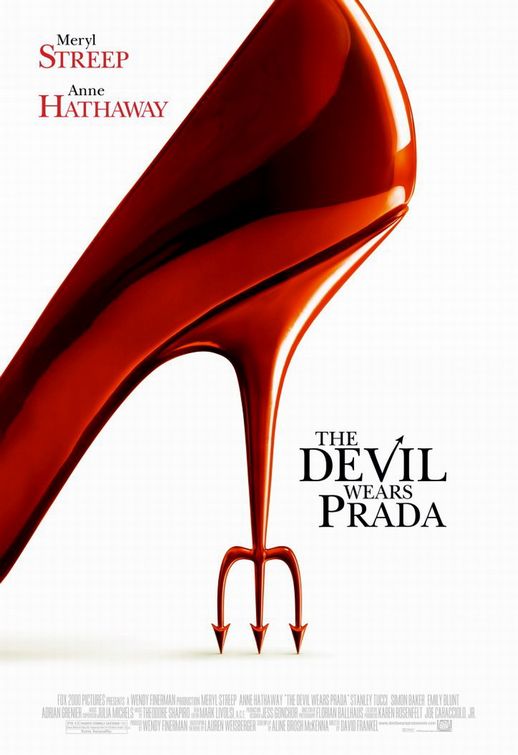“Too Little Too Late”

| None | Light | Moderate | Heavy | |
|---|---|---|---|---|
| Language | ||||
| Violence | ||||
| Sex | ||||
| Nudity |
What You Need To Know:
THE DEVIL WEARS PRADA is funny and engaging. The dialogue is laugh-out-loud funny. It really shows a pagan world as the predominant force in the movie is achieving fame, fortune, success, clothes, and whatever else might feel good at the moment. It is all about doing what feels good. The female protagonist struggles with this but gives in too often. Eventually, she finds herself having sacrificed all of the person who she thought she was. Regrettably, her decision to change comes too little, too late to have any impact in the movie. All in all, THE DEVIL WEARS PRADA is a funny movie that has some value in its message, but demands extreme caution.
Content:
(PaPa, BB, Fe, Ho, L, V, S, AA, D, MM) Strong pagan worldview overall with money, fame and personal needs depicted as being of paramount value, plus strong moral depiction of inner struggle for success and admiration, money and fame versus living a life of genuine relationship with integrity, plus some feminist themes and a homosexual character; six obscenities and one profanity; mild violence as girl is hit by a car, and much emotional abuse as characters are demeaned; implied fornication three times and depicted seduction scene where woman is drunk; no nudity but woman takes off shirt showing lingerie in order to seduce boyfriend, and woman gets dressed, but no exposure occurs; alcohol use depicted in party scenes and woman shown drunk; smoking; and, immoral tones in woman living with her boyfriend, depiction of premarital sex as socially and morally acceptable (even to parent), goal of success and fame depicted as paramount over character and integrity, and anything to become successful goes.
More Detail:
Andy Sachs, played by Anne Hathaway, desires to make it as a journalist, despite being accepted into Harvard Law School. She takes the job of second assistant to fashion mogul Miranda Priestly, editor of a major fashion magazine, in hopes that it will be a stepping stone in her dream of becoming a New York journalist.
Anne Hathaway plays a believable character in Andy, but overacts just a bit. Emily Blunt does a masterful job in her role as nasty mean girl assistant and adds to the movie’s character. Meryl Streep does a masterful job of being the tyrant, Miranda, Queen of the Fashion World. She is the paramount feminist, willing to do whatever it takes to stay on top, because she loves it there and seems to love the power she has to abuse those around her. She does, however, make herself somewhat understood throughout the movie so that you can’t hate her too much.
What carries this film is the dialogue between the characters, especially the scenes with Streep. You need to come ready to listen, so you don’t miss some of the hysterical jabs and responses.
Andy makes up her mind to survive and succeed, no matter what she is put through, even though she initially doesn’t understand the whole fashion world thing, nor does she desire too. She hopes that her survival will open doors for her in the world of journalism.
This film very clearly evaluates what is important in this world. It pits authentic relationship and higher purpose against fame, fortune and success. It looks at the draw of both and the struggle that ensues when we put ourselves into an environment that has values opposing our own. It shows the struggle within as we strive to reach our goals and meet our own needs. What are we all willing to sacrifice to get ahead? How much or ourselves are we willing to sell out to have all that we want? What do we really want anyway? Andy struggles with all of these issues. As she loses herself in the world of fashion, she learns how easy it is to get caught up in something that is so contrary to your character.
Andy is supposed to be the heroine in this film, but her change of heart comes far too late in the story to be heroic. Miranda remains consistent in her character, even as she experiences negative consequences for her choices. She shows throughout that she is willing to hurt, step on, throw down, and demolish anybody and anyone who crosses her. She lives for herself.
The film’s treatment of human sexuality is disappointing. Andy and her boyfriend live together and clearly engage in a sexual relationship. The father who visits seems to support their decision. Then, when trouble ensues in the relationship due to Andy’s divided loyalties, Andy engages in sex with someone else. In spite of the immoral relationship, Andy’s boyfriend, Nate, played by Adrian Grenier, is a wonderful, compassionate and supportive boyfriend. He challenges her to be true to herself.
This movie emotionless. Although it is enjoyable and funny, the ending leaves the audience wondering what was the point of watching this. There really was no negative consequence for bad behavior.
What was more enjoyable was the movie’s clear display of how people can be impacted by choosing to be in an environment that runs so contrary to their natures. Andy makes a clear statement of what this job will mean to her in the beginning, but the deeper she gets into the job, the more skewed her perspective becomes. Everyone is capable of losing their integrity and becoming that which they despise. It takes steadfast adherence to ideals and values in even the smallest of decisions to keep each person safe.


 - Content:
- Content: 




